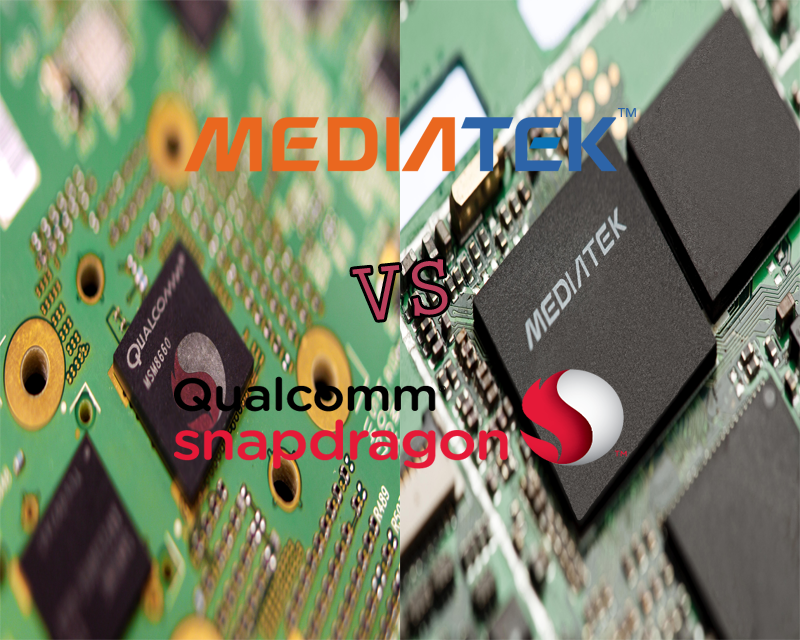In today’s world when everyone has a smartphone and when every other day a new company emerges out of the blue offering a rebranded(read Chinese rebranded) smartphone, it becomes much necessary to check what’s under the hood rather than just the looks. With this point in mind, in this article I will try to point the difference between the processors from the two processor giants, namely Qualcomm and MediaTek.
Looking just a year and half back into the past, it was quite evident that none among the common man understood what a mobile processor was and which one did their latest feature rich smartphone worked on. Comparing it to today, the situation has changed drastically. Now everyone or at least every other person talks processors. People get excited when the operating frequency (a.k.a. GHz) of their latest smartphone beats their friend’s smartphone or any other person’s smartphone by even 0.1 Ghz. Here what they fail to understand is that only frequency cannot determine the performance of their smartphone in day-to-day tasks. Also, the manufacturer from which the processor comes determines the performance, having said that, it will be good if you know at least a few names (you’ll be familiar with at least 2 by now).
Qualcomm, MediaTek, Samsung (you read it right!), Huawei, etc. all manufacture chips for mobile devices. Out of these, only Qualcomm and MediaTek manufacture chips to sell to OEM’s. Both these companies follow a different strategy all together to earn profit (everyone does things to earn profit!). Qualcomm in the past used to manufacture chips for all types of phones ranging from the top notch to some lower mid-range smartphones. It is only in the recent months that we have seen Qualcomm chips in the low-end handset market. On the other hand MediaTek targets the low-end handset market and thus manufactures relatively cheap processors (The smartphone boom in the low-end market is only possible due to MediaTek, say thanks to them!).
These two manufacturers were targeting different markets until recently when Qualcomm started to offer chips for low-end phones also. This is where the real problem starts! On paper a low end processor from Qualcomm might appear to be over powered by a Mediatek processor of the same price (consider the price of the processor only not the handset) but in reality most of the Qualcomm’s processors are better than MediaTek ones. This was mainly because MediaTek did not focus more on the build quality of the chip the way Qualcomm does and hence the chips from MediaTek are cheaper. In the table below I have laid out the specifications of Qualcomm’s Snapdragon 400 MSM 8226 alongside MediaTek’s famous MT6589.
| Parameter | Snapdragon 400 MSM 8226 | MediaTek MT6582 |
| CPU Clock | Up to 1.2 Ghz | Up to 1.3 Ghz |
| Architecture | Cortex A7 | Cortex A7 |
| No. Of Cores | 4 | 4 |
| GPU | Adreno 305 @ 450Mhz | Mali 400MP2 @ 500Mhz |
Theoretically they appear to be almost same but when they are put into test on devices like the Moto G from Motorola(Qualcomm chip) and Micromax or any other local brand as per your choice, the Qualcomm processors beat the MediaTek ones. Both these chipsets offer processors based on Arm Cortex A7 architecture which is fairly power efficient but poor in performance when compared to processors like Qualcomm’s Snapdragon S4 pro series which is a previous generation chip series.
In the above video, we can see that MediaTek’s latest true octa-core cpu: MT6592, beats some Quad-Core CPU from undeclared company (assuming it to be Qualcomm) in gaming performance. This fact cannot be denied but the fact remains that this chipset is also based on ARM Cortex A7 which is an older architecture. Thus when a true octa-core processor of the Cortex A9 or A15 series turns up it will beat this one.
Thus given a choice between a smartphone based on Qualcomm and MediaTek consider buying a Qualcomm based one if and only if other features don’t matter to you much. These days we can find some phones with a decent MediaTek processor and good specification which will be good choice. Over the period of time we can only expect the MediaTek processors to get better.
Do let me know your thoughts by posting in comments below.
– Anish Kumar





Very nicely written
very nice!!!